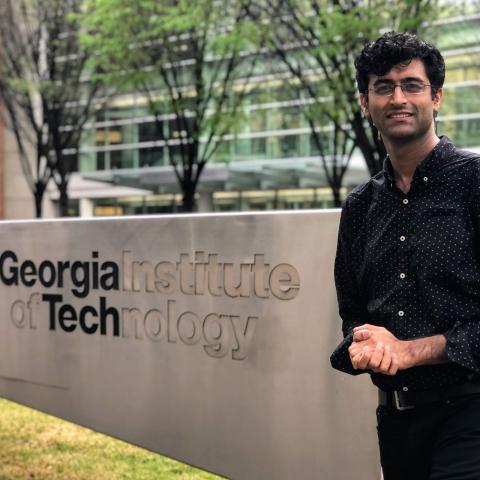Brad Fain, principal research scientist at the Georgia Tech Research Institute (GTRI) and at the Center for Advanced Communications Policy (CACP), has been appointed as executive director of CACP. The appointment was announced on January 2, 2019 by Ivan Allen College of Liberal Arts Dean Jacqueline Royster.
Housed in the Georgia Tech School of Public Policy, CACP focuses on key issues that influence the development, implementation and adoption of communications technologies. CACP work includes assessment of policy issues and production of regulatory filings, identification of future options for innovation, and articulation of a clearer vision of the ever-changing technology landscape. The Center’s research addresses a wide range of advanced communications policy issues and related technology applications, particularly in the wireless and new technology arenas.
Fain brings to bear more than twenty-five years of experience in human performance. He directs Georgia Tech’s HomeLab research initiative and leads a team that is pioneering research into issues and products design to assist with successful aging in place. He joined Georgia Institute of Technology in 1992 and has extensive experience developing technologies, evaluation processes, and curriculum in the field of accessible design. He has also led or assisted in a variety of research programs on the design of fixed and rotary wing crew interfaces, and he currently leads a project to build a virtual reality usability testbed for first responder technologies enabled by FirstNet for the National Institute for Standards and Technology (NIST). He has performed over one hundred accessibility evaluations for national and international customers in twenty projects. He has executed over two hundred consumer product evaluation projects. He pioneered the development of Consumer Product Integration (CPI) as a design process for the realization of products with universal design features.
Fain led the National Council on Disability’s (NCD) universal design research program. The focus of the research program was to determine the impact of Section 508 of the Rehabilitation Act on the design and procurement of electronic and information technologies. Fain’s report contained universal design policy recommendations that were endorsed by the NCD and sent to the president of the United States for consideration. He conceived and led the development of an information portal containing information pertaining to the design and procurement of accessible electronic and information technologies. The Accessibility Assistant (http://accessibility.gtri.gatech.edu) is the culmination of eight years of accessibility research at Georgia Tech and serves over 1,500 visitors monthly.
Fain has also led the technical portion of the EAC’s Military Heroes Initiative to search for new technologies that would allow recently wounded soldiers to place a private and secure vote. He served as the technical director of the EAC’s Accessible Voting Technology Initiative (AVTI) to develop technologies solutions that facilitate accessible voting for the general population. The AVTI resulted in the development of a voting system test bed used to conduct accessibility research for ballot design and novel hardware design. He also led a NIST research grant to determine best practices for quantifying and certifying the accessibility and usability of new voting systems. Fain served as the technical director for the Information Technology and Technical Assistance Training Center (ITTATC) project. He led the needs assessment and technical assistance portions of the ITTATC project and has developed materials to support accessibility curriculum development efforts. He led the development of the Accessibility Evaluation Facility to support independent third-party evaluations of electronic and information technology accessibility and usability. In addition, he led the development of training materials to educate designers and accessibility specialists in the measurement of accessibility. In 2004, Fain modified the AEM to measure ease of use for special populations and, as a result, GTRI was named as the national test lab for the Arthritis Foundation’s Ease of Use Commendation Program.









